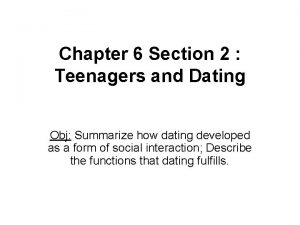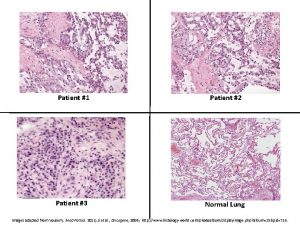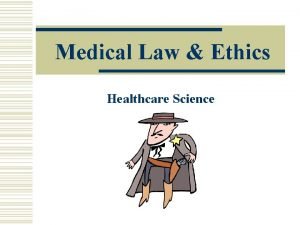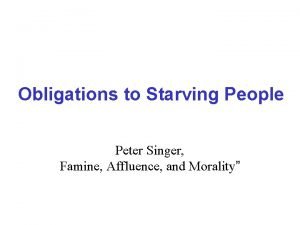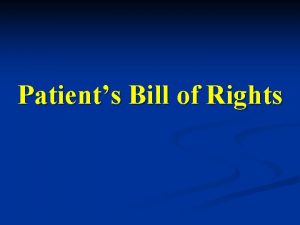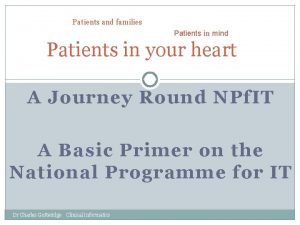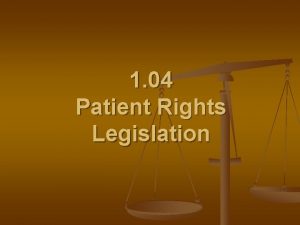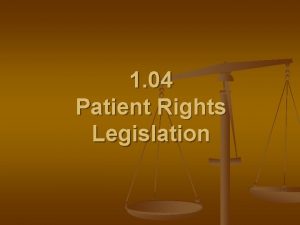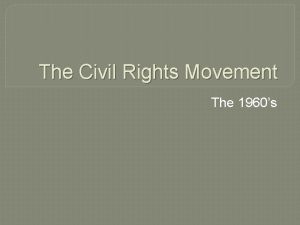Patient Rights Unit 7 Patient Rights 1960s patients




























- Slides: 28

Patient Rights Unit 7

Patient Rights § 1960’s: patients turned to nurses for information § Protection of patient’s right to refuse treatment § Informed consent § Right to privacy § Avoiding false imprisonment 2

Patient Rights Documents § What People Can Expect of Modern Nursing Practices, NLN, 1959 § Statement on Patient’s Bill of Rights, American Hospital Association, 1973 § Citizens Bill of Hospital Rights, Penn. Insurance Dept. , 1973 3

Patient Rights Documents Continued § Bill of Rights for Hospice Patients, Hospice Association of America, 1990 4

Congressional Action § Rehabilitation Act, 1973 § Community Mental health Amendment, 1975 § Education for Handicapped Children Act, 1975 § Dev. Disabled Assist. And Bill of Rights Act, 1978 § Mental Health Systems Act, 1980 § Americans with Disabilities Act, 1990 5

Omnibus Budget Reconciliation Act, 1987 § New requirements for nursing homes and home health § Standard for minimum RN staff § Immediate access for relatives § Access to federal and state officials who investigate complaints 6

Legal Status of Patient Rights § Bills of Rights that become laws or state regulations carry most authority § Hospital may jeopardize funding from Medicare/Medicaid if found in violation of regulations § Bills of Rights professionally binding 7

Informed Consent and the Law § Informed Consent: Information given to the patient regarding treatment and patient agreement to treatment § Standards for Informed Consent: Reasonable Doctor Standard Reasonable Patient Standard 8

Informed Consent: Landmark Ruling § California Supreme Court, 1957 § Negligent nondisclosure § Ruling established basic rule: A doctor violates his duty to his patient and subjects himself to liability if he withholds any facts that are necessary to form basis of an intelligent consent 9

Responsibility for Obtaining Informed Consent § Obtaining informed consent rests with attending doctor for medical acts § Nurses may be required to sign form as a witness 10

Nurses’ Potential Liability § Nurses can be held legally responsible if: 1) Nurse has knowledge the patient has not been adequately informed and 2) Nurse fails to act on this knowledge 11

Two Exceptions to Obtaining Informed Consent § Patient discretion: patient may waive right to be informed; tells doctor not to disclose details; directs doctor to provide info to next of kin § Emergencies: Unconscious patient or minor where family can’t be reached 12

Right to Consent: Birth to Adulthood § Birth rights: confidentiality, privacy during treatments, legal protection from malpractice § Minors: Anyone under 18 or 21 has right to consent to treatment for STDs, serious communicable diseases, drug/alcohol abuse 13

Rights Continued § Mature Minors: sufficiently developed awareness and mental capacity to make decisions about medical care § Adults: Right to consent or refuse medical treatment for self or minor children 14

Legal Right to Refuse Treatment § Quinlan case, 1976, New Jersey § Cruzan v. Director, Mo. Dept. of Health, 1990 § Freedom of Religion: Jehovah’s Witness, 1972, Christian Scientist, 1971 15

Right to Die § Natural Death Laws § Living Will Laws § Durable Power of Attorney: can make medical decisions regarding life and death treatment if patient becomes incapacitated 16

Legislation § Patient Self-Determination Act, 1990 § Must be given written information re rights under state law § Patient decision regarding advance directive must be documented in record 17

Act, 1990 Continued § Health care providers cannot discriminate in any way regardless of advance directive § Facility must provide education for staff and community on advance directive issues 18

Challenging the Right to Refuse Treatment § Patient incompetence: lacks mental ability to make reasonable decision § Delirium § Compelling circumstances: refusal endangers another’s life, child’s life, public interest outweighs patient rights, etc. 19

Nurses’ Response to Patient’s Request to Stop Treatment § Stop preparations for any further treatment § Immediately notify doctor § Report patient’s decision to supervisor 20

Patient’s Right to Privacy § Constitution does not explicitly sanction a right to privacy § Supreme Court has cited several amendments that imply right § Right to make personal choices without outside interference 21

State Law and Right to Privacy § Some states have written privacy provisions into their constitutions § Nearly all recognize the right through statutory or common law 22

Privilege Doctrine § Patient cannot be forced to reveal confidential communication § Few states recognize the nurse-patient relationship as protected 23

When Confidential Information Must Be Disclosed § Child abuse cases § Criminal cases § Government request: IRS, EPA, Dept of Labor, HHS § Public’s right to know - President’s annual physical exam 24

When Confidential Information May Be Disclosed § Welfare of a person or group is at stake § When disclosure is necessary for continued care § If patient consents to disclosure § To protect public or individuals from harm 25

When Patients Demand Records § Right to Access: some states guarantee direct access, may have to subpoena records in other states § Cannell v. S. C. Clinic, 1974: patient has a right to know treatment details and right to info because of payment 26

Patient Discharge Against Medical Advice § Patient has legal right to leave § Patient should be adequately informed § Contact patient’s family - optional § Explain AMA procedure § Give patient AMA form to sign § Provide discharge care 27

Lawful Detention § Restraint, when necessary, is lawful with psychiatric patients, prisoners, and violent patients § Restrain patient only if medical conditions warrants or if authorities (police, courts, etc. ) instruct to do so 28
 Patients rights charter
Patients rights charter 12 patient rights
12 patient rights Se hinton 1960
Se hinton 1960 Food of the 1960s
Food of the 1960s History of extreme programming
History of extreme programming Software crisis in software engineering
Software crisis in software engineering 60s fashion greaser
60s fashion greaser First email ray tomlinson
First email ray tomlinson Obj dating
Obj dating Se hinton background
Se hinton background 1960s fashion history
1960s fashion history Madras shirt 1960s outsiders
Madras shirt 1960s outsiders Up until the 1960s
Up until the 1960s Where were sneakers manufactured until the 1960s
Where were sneakers manufactured until the 1960s Patient 2 patient
Patient 2 patient Rights of the patient in hospital
Rights of the patient in hospital Rights of the patient in hospital
Rights of the patient in hospital Rights of the patient in hospital
Rights of the patient in hospital Role of medical records
Role of medical records Unit 10, unit 10 review tests, unit 10 general test
Unit 10, unit 10 review tests, unit 10 general test Positive rights and negative rights
Positive rights and negative rights Littoral real estate
Littoral real estate Conclusion of rights
Conclusion of rights Legal rights vs moral rights
Legal rights vs moral rights Positive and negative rights
Positive and negative rights Negative right
Negative right Negative rights vs positive rights
Negative rights vs positive rights Negative right
Negative right The method used for transferring a patient depends on
The method used for transferring a patient depends on








